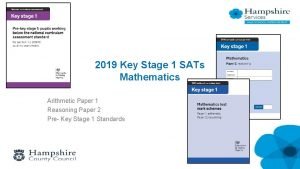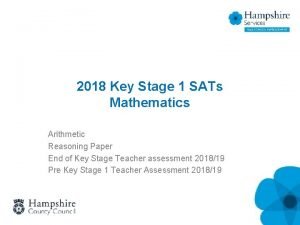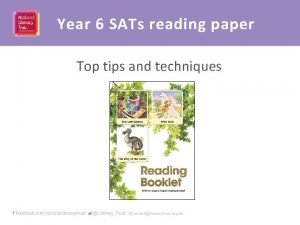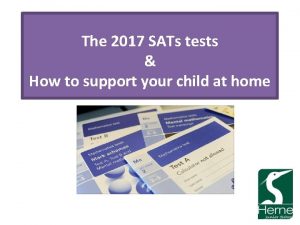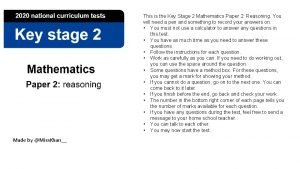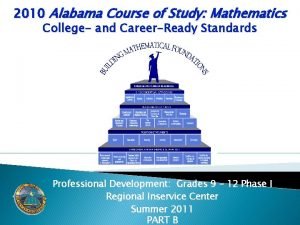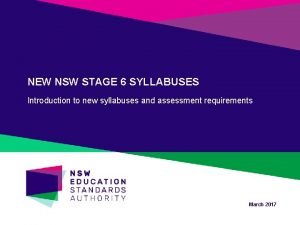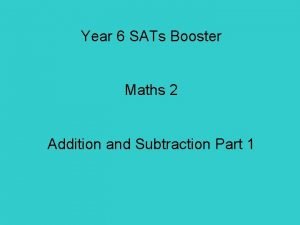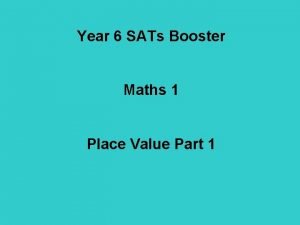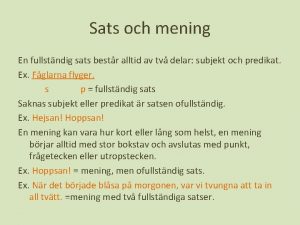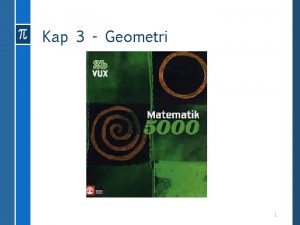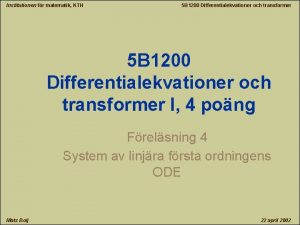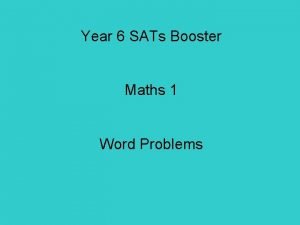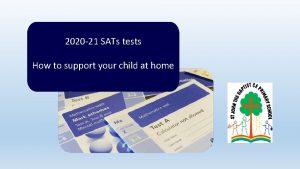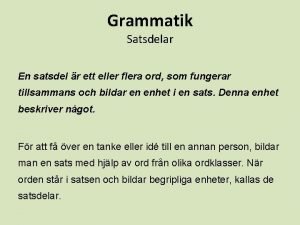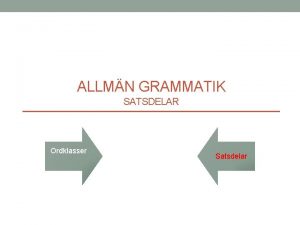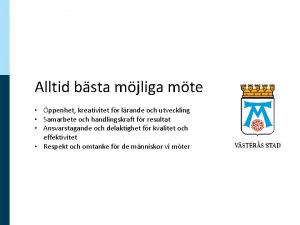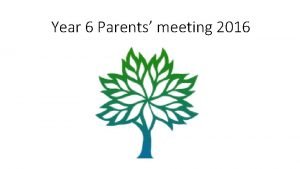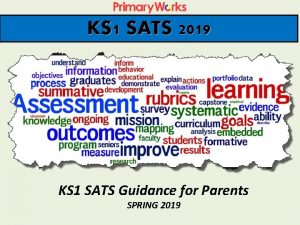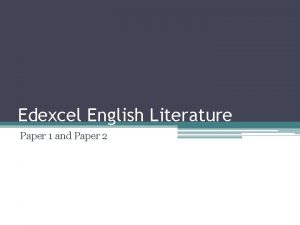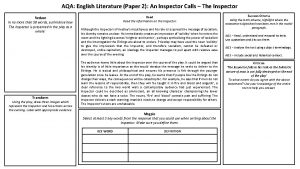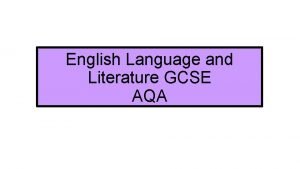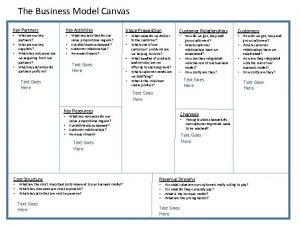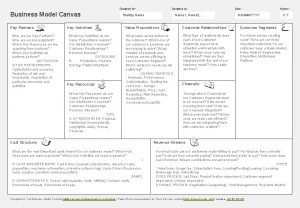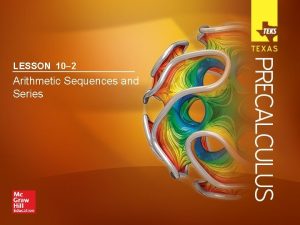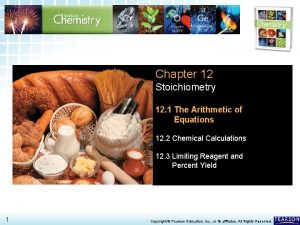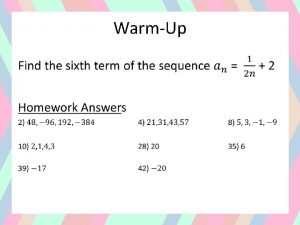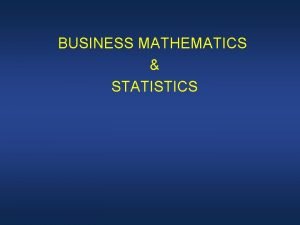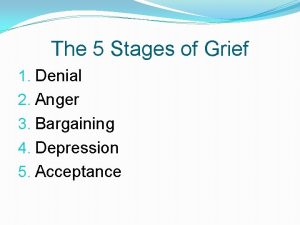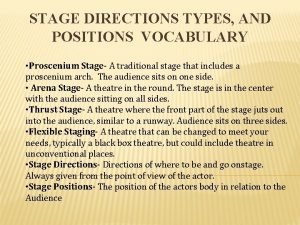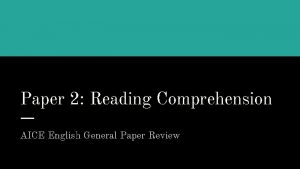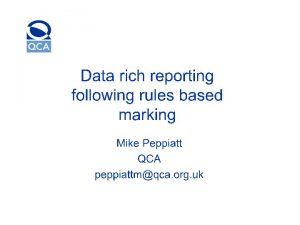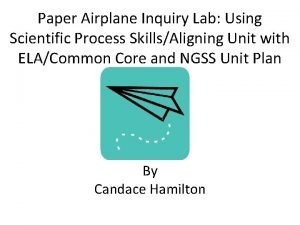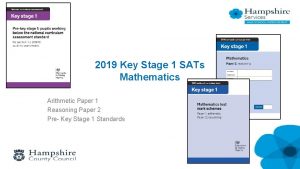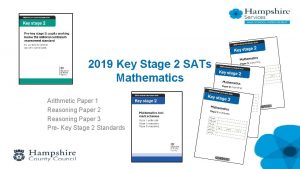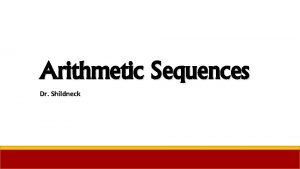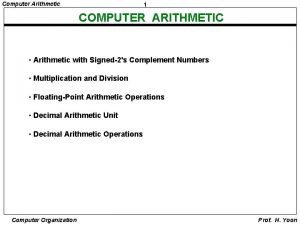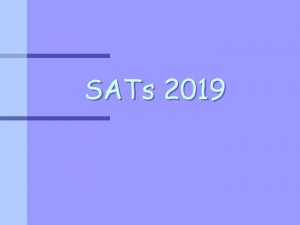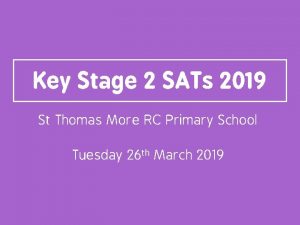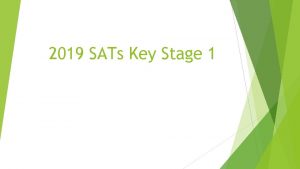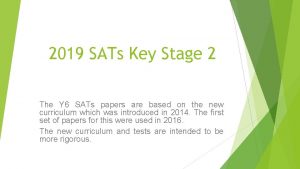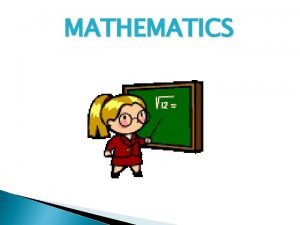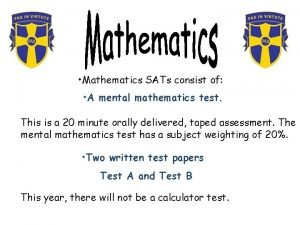2019 Key Stage 1 SATs Mathematics Arithmetic Paper




















































- Slides: 52

2019 Key Stage 1 SATs Mathematics Arithmetic Paper 1 Reasoning Paper 2 Pre- Key Stage 1 Standards

Key Stage 1 SATs papers 2019 https: //www. gov. uk/government/publications/key-stage-1 -tests-2019 -mathematics-test-materials? utm_source=e 3 a 18 ed 38191 -4 d 7 d-9 de 6 -d 98 a 35 b 77385&utm_medium=email&utm_campaign=govuk-notifications&utm_content=immediate Key stage 1 SATs 2019 scaled scores Details A scaled score between 100 and 115 shows the pupil has met the expected standard in the test. The lowest scaled score that can be awarded on a key stage 1 test is 85. The highest score is 115. Pupils need to have a raw score of at least 3 marks to be awarded the minimum scaled score. The subjects are listed on separate tabs within the Excel spreadsheet. https: //www. gov. uk/government/publications/2019 -scaled-scores-at-key-stage-1? utm_source=ac 7 db 3 d 8 -736 c-4 dbb-a 6 b 27 da 09 aa 98 aee&utm_medium=email&utm_campaign=govuk-notifications&utm_content=immediate Understanding scaled scores at key stage 1 https: //www. gov. uk/guidance/understanding-scaled-scores-at-key-stage-1? utm_source=36 c 460 f 0 -d 4 c 3 -4291 -a 08 d 4227 fd 051299&utm_medium=email&utm_campaign=govuk-notifications&utm_content=immediate

Understanding scaled scores at key stage 1 https: //www. gov. uk/guidance/understanding-scaled-scores-at-key-stage-1? utm_source=36 c 460 f 0 -d 4 c 3 -4291 -a 08 d 4227 fd 051299&utm_medium=email&utm_campaign=govuk-notifications&utm_content=immediate What is a scaled score? Tests are developed to the same specification each year, however, because the questions must be different, the difficulty of tests may vary slightly each year. This means we need to convert the total number of marks a pupil gets in a test (their ‘raw’ score) into a scaled score, to ensure we can make accurate comparisons of pupil performance over time. Pupils scoring at least 100 will always have met the expected standard on the test. However, given that the difficulty of the tests may vary each year, the number of raw score marks needed to achieve a scaled score of 100 may also change. For example, if the overall difficulty of a test decreases compared with previous years, the raw score required to meet the expected standard will increase. Similarly, if the test is more difficult, the raw score required to meet the expected standard will decrease. In 2016, panels of teachers set the raw score required to meet the expected standard. We have used data from trialling to maintain that standard for the tests from 2017 onwards.

https: //www. gov. uk/guidance/un derstanding-scaled-scores-atkey-stage 1? utm_source=36 c 460 f 0 -d 4 c 34291 -a 08 d 4227 fd 051299&utm_medium=e mail&utm_campaign=govuknotifications&utm_content=imm ediate

Range of scaled scores and the expected standard The range of scaled scores available for each test is the same as set in 2016 and is intended to stay the same in future years. The lowest scaled score that can be awarded on a KS 1 test is 85. The highest scaled score is 115. Pupils scoring at least 100 will have met the expected standard in the test. A pupil awarded a score of 99 or less has not met the expected standard in the test. Pupils need a minimum raw score before they can be awarded the lowest scaled score. Pupils who do not achieve the lowest scaled score on the test have not demonstrated sufficient understanding of the KS 1 curriculum in the subject. You should award these pupils an N for the test. It is likely that these pupils should be teacher-assessed using the prekey stage standards. The conversion tables also show that sometimes 2 or more raw scores convert to the same scaled score. This is because data from pupils showed that the attainment of pupils who score these total marks is not very different. There also times when it is not possible to achieve a particular scaled score on this test. This is because of the limited number of questions in these tests, although these scores may be possible on previous or future tests https: //www. gov. uk/guidance/understanding-scaled-scores-at-key-stage 1? utm_source=36 c 460 f 0 -d 4 c 3 -4291 -a 08 d 4227 fd 051299&utm_medium=email&utm_campaign=govuknotifications&utm_content=immediate

Using and interpreting test outcomes You should use evidence from the English reading and mathematics tests to inform your teacher assessment judgement for each pupil. You can also use the optional KS 1 English grammar, punctuation and spelling test to inform your teacher assessment judgement in English writing. The tests can provide evidence that a pupil has met certain ‘pupil can’ statements, as well as evidence to support the judgement overall. Tests and teacher assessment are different forms of assessment, so it is not necessary for the outcomes to be the same. The national curriculum tests are compensatory – as pupils can score marks from any parts of the tests, pupils with the same total score may achieve their marks in different ways. The teacher assessment frameworks are different and ask teachers to assess pupils against certain aspects of the national curriculum, based on a range of evidence from the classroom. It is possible for a pupil to have met the expected standard in the test, but not for teacher assessment, because of gaps in their knowledge or understanding. It is also possible for pupils to have demonstrated their attainment of the ‘pupil can’ statements through their classwork, but not to have achieved the mark for a related question on the test. If a pupil gets a question wrong in the test on an area of the curriculum that they have demonstrated in their classwork, the teacher will want to take this into consideration when making their teacher assessment judgement. Together, the tests and teacher assessment provide a broader picture of pupil attainment https: //www. gov. uk/guidance/understanding-scaled-scores-at-key-stage 1? utm_source=36 c 460 f 0 -d 4 c 3 -4291 -a 08 d 4227 fd 051299&utm_medium=email&utm_campaign=govuknotifications&utm_content=immediate

2019 Key Stage 1 Scaled scores: mathematics https: //www. gov. uk/government/publicati ons/2019 -scaled-scores-at-key-stage-1

Statutory guidance Pre-key stage 1 standards For teachers to report assessment outcomes for pupils working below the standard of national curriculum assessments (commonly called SATs) at the end of KS 1. Details Pre-key stage standards are for pupils who are working below the overall standard of national curriculum assessments, but who are engaged in subject-specific study. 2018 to 2019 Pre-key stage 1 standards Teachers must use these standards to make statutory teacher assessment judgements at the end of key stage 1 for pupils who are working below the national curriculum teacher assessment frameworks, and above P scale 4. If a pupil is working below these standards, teachers should report their outcomes using P scales 1 to 4. These are for use from the 2018 to 2019 academic year onwards. They are the same documents that we originally published in May 2018 to give teachers advance notice of the final standards. . https: //www. gov. uk/government/publications/pre-key-stage-1 -standards

Pre Key Stage 1 …teachers need to have evidence which demonstrates that the pupil meets all of the statements within that standard. ’ ‘Assess each individual pupil based on their own method of communication, and disregard statements which a pupil is physically unable to access. ’

Key Stage 1 Mathematics Mark Scheme https: //www. gov. uk/governmen t/publications/key-stage-1 tests-2019 -mathematics-testmaterials

https: //www. gov. uk/government/publications/key-stage-1 -tests-2019 -mathematics-test-materials

https: //www. gov. uk/governme nt/publications/key-stage-1 tests-2019 -mathematics-testmaterials

Key Stage 1 Arithmetic Paper 2019 https: //www. gov. uk/government/publications/key-stage-1 -tests-2019 -mathematics-test-materials

Key Stage 1 Arithmetic Paper 2019 https: //www. gov. uk/government/publications/key-stage-1 -tests-2019 -mathematics-test-materials

Key Stage 1 Arithmetic Paper 2019 https: //www. gov. uk/government/publications/key-stage-1 -tests-2019 -mathematics-test-materials

2019: KS 1 Arithmetic Paper Addition and subtraction https: //www. gov. uk/government/publications/key-stage-1 -tests-2019 -mathematics-test-materials

2019: KS 1 Arithmetic Paper Multiplication and Division https: //www. gov. uk/government/publications/key-stage-1 -tests-2019 -mathematics-test-materials

2019: KS 1 Arithmetic Paper Fractions https: //www. gov. uk/government/publications/key-stage-1 -tests-2019 -mathematics-test-materials

https: //www. gov. uk/government/publications/key-stage-1 -tests-2019 -mathematics-test-materials

Key Stage 1 Mathematics Mark Scheme https: //www. gov. uk/government/publications/key-stage-1 tests-2019 -mathematics-test-materials

2019 Key Stage 1: Paper 2 Reasoning

2019 Key Stage 1: Paper 2 Reasoning

2019 Key Stage 1: Paper 2 Reasoning

2019 Key Stage 1: Paper 2 Reasoning

2019 Key Stage 1: Paper 2 Reasoning

2019 Key Stage 1: Paper 2 Reasoning

2019 Key Stage 1: Paper 2 Reasoning

2019 Key Stage 1: Paper 2 Reasoning

2019 Key Stage 1: Paper 2 Reasoning

2019 Key Stage 1: Paper 2 Reasoning

2019 Key Stage 1: Paper 2 Reasoning

2019 Key Stage 1: Paper 2 Reasoning

2019 Key Stage 1: Paper 2 Reasoning

2019 Key Stage 1: Paper 2 Reasoning

2019 Key Stage 1: Paper 2 Reasoning

2019 Key Stage 1: Paper 2 Reasoning

2019 Key Stage 1: Paper 2 Reasoning

2019 Key Stage 1: Paper 2 Reasoning

2019 Key Stage 1: Paper 2 Reasoning

2019 Key Stage 1: Paper 2 Reasoning

2019 Key Stage 1: Paper 2 Reasoning

2019 Key Stage 1: Paper 2 Reasoning

2019 Key Stage 1: Paper 2 Reasoning

2019 Key Stage 1: Paper 2 Reasoning

2019 Key Stage 1: Paper 2 Reasoning

2019 Key Stage 1: Paper 2 Reasoning

2019 Key Stage 1: Paper 2 Reasoning

2019 Key Stage 1: Paper 2 Reasoning

2019 Key Stage 1: Paper 2 Reasoning

2019 Key Stage 1: Paper 2 Reasoning

2019 Key Stage 1: Paper 2 Reasoning

2019 Key Stage 1: Paper 2 Reasoning
 Sats paper 2019
Sats paper 2019 Key stage 1 reasoning paper 2018
Key stage 1 reasoning paper 2018 Year 6 sats 2019 papers
Year 6 sats 2019 papers Year 6 sats 2019
Year 6 sats 2019 English sats 2019
English sats 2019 Year 6 sats revision timetable
Year 6 sats revision timetable Sats revision tips
Sats revision tips 2017 sats reading
2017 sats reading Key stage 2 maths paper 2 reasoning answers
Key stage 2 maths paper 2 reasoning answers Alabama course of study math 2019
Alabama course of study math 2019 2017 arithmetic paper mark scheme
2017 arithmetic paper mark scheme Stage 6 syllabus
Stage 6 syllabus Sats booster maths
Sats booster maths Sats booster maths
Sats booster maths Sats week
Sats week Huvudsats och bisats
Huvudsats och bisats Steiners sats
Steiners sats Mittpunktsformeln
Mittpunktsformeln Sats transformer
Sats transformer Sats booster maths
Sats booster maths Sats tests 2020
Sats tests 2020 Ofullständig sats
Ofullständig sats What are sats
What are sats Vad är predikatsfyllnad
Vad är predikatsfyllnad Satslära synonym
Satslära synonym Sats västerås
Sats västerås Delbarhetsregler
Delbarhetsregler Year 6 sats 2016
Year 6 sats 2016 1 ks sats
1 ks sats Gcse edexcel english literature
Gcse edexcel english literature Is inspector calls paper 1 or 2
Is inspector calls paper 1 or 2 Aqa english literature paper 1 2019 a christmas carol
Aqa english literature paper 1 2019 a christmas carol Cost structure example business model canvas
Cost structure example business model canvas Business model canvas tripadvisor
Business model canvas tripadvisor Mathematical treasure hunt examples
Mathematical treasure hunt examples 10-2 practice arithmetic sequences and series
10-2 practice arithmetic sequences and series Section 12.1 the arithmetic of equations answer key
Section 12.1 the arithmetic of equations answer key 10-2 practice arithmetic sequences and series answer key
10-2 practice arithmetic sequences and series answer key Business mathematics module 3
Business mathematics module 3 Stage one denial stage two
Stage one denial stage two Stage right stage left diagram
Stage right stage left diagram Stage left vs right
Stage left vs right Single stage tendering
Single stage tendering What is drama
What is drama Stage right stage left diagram
Stage right stage left diagram English general paper paper 2 comprehension
English general paper paper 2 comprehension General paper questions
General paper questions English 2 staar
English 2 staar Key stage 3 ict tests
Key stage 3 ict tests Upper key stage 2 maths
Upper key stage 2 maths Key stage 1 scaled scores
Key stage 1 scaled scores Image segmentation in digital image processing
Image segmentation in digital image processing Paper airplane lab answer key
Paper airplane lab answer key
